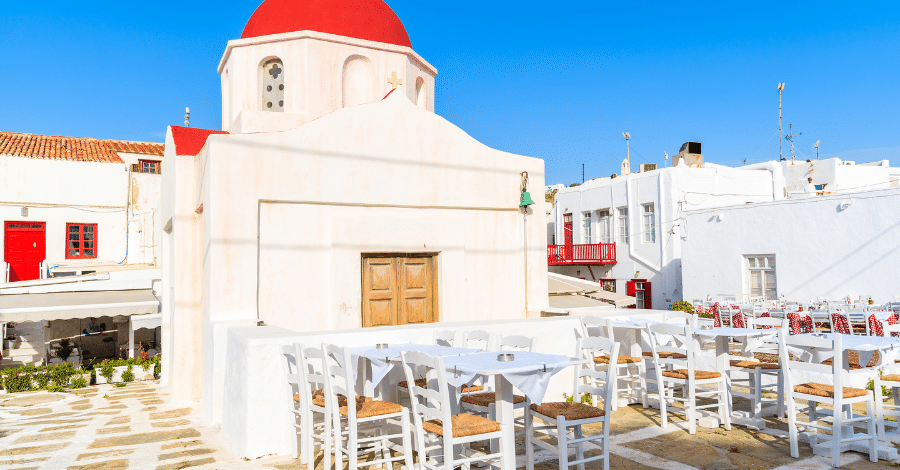Deciding to move to Greece is certainly a big decision, but one you will not regret. There is plenty that you may already know about Greece, including its nickname ‘the cradle of civilization,’ as democracy, theatre, and the Olympic Games started there. How about some surprising facts about Greece?
The country has a beautiful mainland and thousands of pretty islands – with more than 200 of them inhabited. Greece enjoys nearly 300 days of sunshine each year, and no part of the country is more than 90 miles or 140 km from the sea.
There are also many surprising facts about the Greeks that you may not know, which will definitely help you ease into your new life.
The biggest and most important fact is that the Greeks are warm and friendly and will welcome you with open arms. They are also hard-working people and this is noticeable in day-to-day life.

1. Greek families are large
Family life is very important, and families regularly get together. Young children are always included in events and are rarely – if ever – left at home with babysitters.
For all the large religious festivals, especially Easter, which is the most important, the family will get together in their home village. In the past, most would live there, but many younger Greeks leave their home village and move to towns and cities.
Family members who are studying or working abroad also try to get back for Easter, and all the flights are full.
In Greece, when the family shares a meal on such occasions, there can often be more than 30 people around the table. Housewives spend days preparing the traditional array of food.
Each festival has its own traditional dishes. For example, on Easter Sunday, there is spit-roasted lamb and flaounes – cheese buns made with a special type of cheese. After the 40-day Lenten fast, everybody tends to eat too much.

2. Elderly relatives are well cared for
Older family members are held in high esteem by Greeks, who ensure that they are well cared for, especially if they are on their own because their husband/wife has passed away.
Retirement homes in Greece are still rare because grandparents usually live with one of their children and their grandchildren until they die. If children have left school and managed to secure a job in the area, they too will usually live in the family home until they marry.
3. Name days are very important
It is only in the last decades that some Greek children have been given modern names and celebrate their birthday, rather than their Name Day. It has always been the tradition that babies would be given the name of the Saint linked to the day on which they were born. For example, the 5th day of April is the Name Day of Panayiotis, and 8th day of April is Lazaros.

Alternatively, parents give their new baby the name of one of their grandparents. As you can imagine, having one grandparent and three grandchildren with the same name can be very confusing.
The biggest Name Day celebrations take place on the 30th of November each year when it is the Name Day of Andreas (St Andrew) and variations such as Andrea. The Name Day for Maria is on 15 August and is a major church festival celebrating the Virgin Mary.
When it is someone’s Name Day, they will often gather friends to buy them a drink and give them a cake. If you are invited to someone’s Name Day celebration, it is usual to take flowers or a plant for a lady and a bottle of wine or ouzo for a man. The greeting used for the person celebrating is ‘chronia polla,’ which is similar to ‘many happy returns.’
4. Days start early in Greece
Greeks tend to get up early to try and beat the heat. Housewives can be seen cleaning all the outside terraces of their houses at first light.
During the spring months, they take an early morning walk in the local fields too, in search of wild mushrooms (marantaria), snails (salinkária), and wild asparagus (sparángi). There are many different types of edible wild leaves that taste really good dipped in olive oil.
The day usually begins with a cup of strong black Greek coffee, but most do not eat any breakfast pastry or bread until about 10:00.
5. Many Greeks have several jobs
In addition to their main job, many Greeks also help out in their family business, be it a hotel, restaurant, or winery.

Sometimes, you may have an appointment with someone, only to discover that they have been unable to come to work as the family’s vineyard has been tested, and the grapes must be harvested as quickly as possible, requiring their help.
6. The traditional Greek diet really works
Traditionally, Greeks have eaten plenty of vegetables, salads, pulses, and seeds along with fresh fish and lots of olive oil. Greek food has been proven to be very good for health. In the typical Greek’s diet, red meat is only eaten a few times a year during major festivals.

The average lifespan in Greece is 83 years, and Greece is among the top ten healthiest countries in the world. Most Greeks grow some vegetables, and even if they live in towns, you will see olive oil drums filled with tomato plants perched on window sills and steps.
Much of the produce is organic and locally grown, so it is seasonal. Greek housewives shop regularly throughout the week for fresh produce as they do not use frozen or canned food very often.
7. Shops are open till late
Many small bakeries and food shops are open early in the morning but are closed for several hours in the early afternoon so that everyone can enjoy their siesta.

Shops usually reopen at 4:00 pm and will then remain open until late evening. Traditionally, most shops have remained closed on a Sunday, but those situated in what is designated a ‘tourist area’ are allowed to open on a Sunday too.
8. Natural remedies are best
Although there are several pharmacies in every town, many Greek families still prefer to use natural remedies to ease minor health problems.
If you mention you have a health complaint to a Greek, you are likely to be advised on exactly which herbal tea is best to use. Greeks believe that herbal medicines often take slightly longer to work, but they can be very effective.
9. Modesty is key
Although there are nudist beaches in Greece, it is inappropriate to walk around villages and towns immodestly dressed – far better for women to wear longer shorts, and men to slip on a shirt or tee-shirt.
The Greeks are very religious, and if you are planning to visit some of their beautiful churches or monasteries, it is essential that you are properly dressed. Men and women should have their knees and shoulders covered.
If you do not abide by this dress code, you will be required to put on one of the supplies of ‘one size fits all’ gowns, or if these are not available, you will be turned away.
10. Greeks have a natural curiosity
You will certainly be made welcome in Greece, and it is easy to have a conversation as most younger Greeks speak excellent English. They are genuinely delighted to learn all about you and life in your home country, but some of their questions may seem quite nosy.
You may well be asked where you live, how much did you pay for your property or how much is the rent, and how much is your salary. If you don’t want to share such information, just politely decline.

